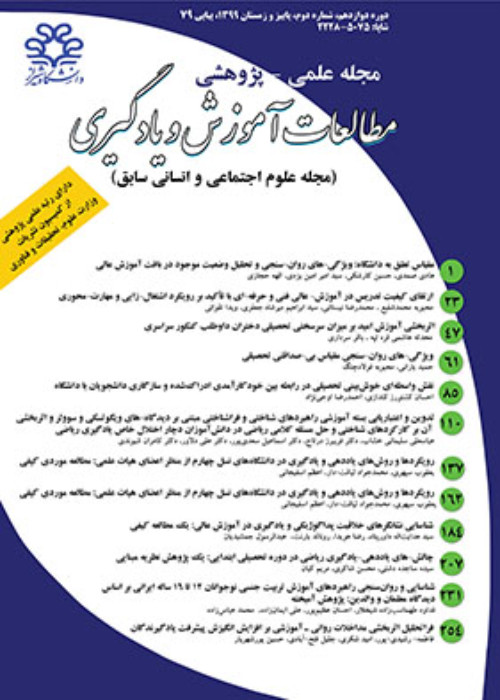The effect of life skills training on the marital adjustment of 20-40 years old married women learners in Nehzat Savaad Amoozi in Ahvaz with control of duration of marriage
Author(s):
Abstract:
IntroductionOne of the important factors affecting the growth and stability of the family is a healthy relationship and mutual understanding among family members, especially between wife and husband. Marital adjustment is one of the most important factors influencing the family dynamic (Sinha & Mukerjee, 1999).Marital adjustment affects parental action, life expectancy, health, satisfaction with life, degree of loneliness, growth and upbringing of children, social relationships and propensity to social deviation (Ahmadi et al, 2005).Studies show that couples that suffer from differences in attitude and poor marital adjustment in relation to communication skills are inefficient and are caught up in an unproductive pattern of communication (Weiss & Heiman, 1997; Gottman, 1994; Lower, 2005). If couples do not gain communication skills and the ability to resolve their differences appropriately, they will never be able to break out of this pattern and this verbal and behavioural dysfunction will continue and gradually, the marital adjustment will begin to erode (Douglass et al 1995). Because of their multiple roles, women are effective elements in both family and society. Women in the family can therefore play a crucial role in the stabilisation of the marital relationship. Women who have a good understanding of emotion and have positive self-esteem have greater marital adjustment (Yazdi & Golzari, 2005). Life-skills increase the ability of the individual to adjust to their environments and the challenges within them. They permit individuals efficiently and effectively to face their social, educational, working and family environments (Nejat, 2006). Life skills promote psycho-social abilities and consequently lead to social, psychological and physical health. These abilities help individuals to face the difficulties they encounter in their circumstances and allow them to have positive relationships with other individuals, society, culture and their own environment, as well as promoting their psychological health (Ghasem Abadi & Khani, 1998).However, what is currently known as life skills is not only the result of modern-day research, but stems from religious training. Thus, efforts are made to promote the establishment of the effective and useful communication, as well as self-knowledge, and attention to values, which are crucial components in life-skills education and are repeatedly emphasised in various Islamic sources, such as the Quran, the Nahj-ol-Balagheh, Sahifeh Sajadieh, and the writings of other Imams (Taremiyan et al, 1999).The aim of this research is to look at the effectiveness of life-skills training of women in Nehzate Savad Amozi (an adult literacy programme).Research Questions1. Does life-skills training cause an increase in marital adjustment of married women in the Nehzate Savad Amozi?2. Does life-skills training cause an increase in marital adjustment of married women in the Nehzate Savad Amozi, with the control variable of the duration of marriage?MethodThe population in this research was married women aged between 20 and 40 in the Nehzate Savad Amozi in the city of Ahvaz, in 2007. The sample in this research comprised 50 women chosen by a random cluster sampling approach. City, two areas (areas 2 and 4) were chosen randomly. Five centres in each of these areas were chosen randomly. These 50 women were aged between 20 and 40, and living with their husbands. Locke & Wallace’s test was applied and those who obtained a score of under 100 were selected for the sample (the section grade [cut-off point] in the Locke & Wallace marital adjustment questionnaire is 100). The sample was divided randomly into two groups (a control group and an experimental group); each group containing 25 persons. One person from the experimental group dropped out of the training programme; therefore it was decided to conduct the analysis with 48 women (24 persons from each group). In this research, for the purposes of the measurement of the dependent variable, the Locke & Wallace test (ASZLW) was used. After the sample and different groups had been established, the experimental group had 10 meetings on life-skills training lasting between 60 and 70 minutes each, twice a week.ResultsThe result of this research showed that after life-skills training, there were significant difference between the control group and the experimental group with respect to marital adjustment. In other words, life-skills training led to the enhancement of marital adjustment in the experimental group.Discussion and ConclusionIn interpreting the findings, it could be concluded that this method of life-skills training can be effective in improving the interaction between married couples. This method of training includes listening, talking and giving effective non-verbal responses in order to improve the quality of the relationship between husband and wife.Another behavioural approach of life-skills training encourages a recognition responses, which has an effect on individuals’ subsequent interaction behaviour and hence on marital adjustment. Another explanation of the study hypotheses is that a direct effect of life-skills training is control of the situations in which violence and crises may arise. In addition, acquiring problem-solving skills leads to the ability to manage problems effectively as and when they arise, consequently enhancing couples’ overall satisfaction with marital life. Couples’ proficiency in anger and stress control not only makes families more resistant when facing challenges and undesirable situations, but also increases their ability to deal with stressful events. In addition, the findings of this research also showed that the duration of the marriage did not affect the marital adjustment of the two groups (experimental and control groups). If a couple trust each other, share outside interests, discuss issues with each other calmly and change their attitudes, they gain the greatest satisfaction from marital life, whatever the duration of their marriage. In fact, the aim of life-skills training is to reduce the effect of this variable (duration of marriage) and consequently increase the effect of the aforementioned educational skills on the adjustment of couples. Effective communication skills, with the training of correct method of interaction between individuals and ways of resolving disagreement, lead to increasing adjustment, regardless of the duration of the marriage.
Language:
Persian
Published:
Studies in Learning & Instruction, Volume:2 Issue: 1, 2011
Page:
125
magiran.com/p966256
دانلود و مطالعه متن این مقاله با یکی از روشهای زیر امکان پذیر است:
اشتراک شخصی
با عضویت و پرداخت آنلاین حق اشتراک یکساله به مبلغ 1,390,000ريال میتوانید 70 عنوان مطلب دانلود کنید!
اشتراک سازمانی
به کتابخانه دانشگاه یا محل کار خود پیشنهاد کنید تا اشتراک سازمانی این پایگاه را برای دسترسی نامحدود همه کاربران به متن مطالب تهیه نمایند!
توجه!
- حق عضویت دریافتی صرف حمایت از نشریات عضو و نگهداری، تکمیل و توسعه مگیران میشود.
- پرداخت حق اشتراک و دانلود مقالات اجازه بازنشر آن در سایر رسانههای چاپی و دیجیتال را به کاربر نمیدهد.
دسترسی سراسری کاربران دانشگاه پیام نور!
اعضای هیئت علمی و دانشجویان دانشگاه پیام نور در سراسر کشور، در صورت ثبت نام با ایمیل دانشگاهی، تا پایان فروردین ماه 1403 به مقالات سایت دسترسی خواهند داشت!
In order to view content subscription is required
Personal subscription
Subscribe magiran.com for 70 € euros via PayPal and download 70 articles during a year.
Organization subscription
Please contact us to subscribe your university or library for unlimited access!




